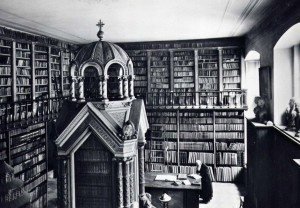Much has been said and written about the Mekhitarist Fathers but little is ever mentioned about the seminarians of this Armenian Catholic Order.

During my year of study in Vienna in 1960, there were 25 boys studying at the monastery between the ages of 7-15. Once a boy reaches 15, he automatically becomes a brother and is allowed to wear a black robe.
The number of brothers is quite limited, not to mention the priests. At the time, one in 20 ever made it to the priesthood. When a seminarian has completed his studies, he is sent to the University of Vienna for additional courses in theology before being ordained.
Why do they start so young?
These boys began their education at the monastery, pending their age. If a boy decided he wanted to become a priest, the monastery paid for his traveling expenses, fed him, housed him and educated him with no guarantee.
If he reached an age where he decided that being a priest was not for him, the boy could leave at his wish and the monastery would subsidize his traveling expenses back home.
In this way, the Mekhitarist Congregation is serving the Armenian generation. One interesting note is that if a boy studied for the priesthood and became ordained, back then it was equivalent to a $20,000 expense. Today, of course, it would be substantially more.
A good number of these boys came from such countries as Lebanon, Egypt, Syria, and Hungary. During my stay, I did not encounter anyone from America or Armenia.
A period of adjustment is quite rigid as one might imagine. Seminarians were being educated by the priests who themselves were specialists in their own fields. One priest had a doctorate in physics, another in psychology. As a seminarian got older, he took certain vows that were carried out in the strictest order.
Their social activities were limited but they did have their fun. There were frequent hikes to the mountains, some quite long. Instead of being enthusiastic over gifts and toys at Christmas, the holiday revolved around prayer and decorating a huge Christmas tree in the dining hall.
A rubber ball, bag of marbles, perhaps even a box of candy was sufficient. Their main concern, even at age 8, was God. They would think alike, sometimes even look alike, stick together, help one another when the time came, and live together in the true sense of harmony.
Their one ambition was to become a priest and serve God. Being assigned to America was a huge incentive. America to these boys represented the land of golden dreams. The mere mention of the country caused their eyes to gleam with curiosity.
It was easy to adopt the whole lot. I found the boys extremely well disciplined, focused on their mission, and affable. They would gather around you with every visit, much like the children of Armenia, and gain your attention. A piece of hard candy was a bonus.
Their summer residence was a camp within proximity of the motherhouse where games were played and chores done. Business and pleasure went hand-in-hand.
In the years that followed, my family made it a point to send a cache of gifts each Christmas. One year it was school supplies, another year a generous supply of backgammon sets. Letters were sent offering their gratitude.
I say this with a great deal of sentiment. In 2006 while visiting Armenia, we had stopped at Noravank. While I was off photographing the beauty of this church, a member of our group came after me in hot pursuit.
“Come quickly,” he said. “There’s someone here who seems to know you from the monastery when you were there as a child.”
Upon my approach, I noticed a man with his wife and two children. He introduced himself as Avedis and his eyes filled with a tear.
“Do you remember me?” he said. “You were in Vienna when I was there. You used to visit with two other students and you always had a surprise for us.”
He remembered me. I didn’t recall his name. He studied for five years and decided to return home. He told me the education he had received from the Mekhitarists went a long way toward developing his maturity and sense of values. He was now living in California with his family and was working as a high-tech engineer.
There we were, in some far off place in the world, locked in a friendly embrace. It was the highlight of my trip to Armenia that year—and I’m sure his.
To be continued…


1960 I was a 12 year old boy from Romania, part of the Armenian exodus from that country. My father had attended the Venice school in his youth and greately benefited by his education there. As a Cilician Catholic family from Kayseri, we had an easier ticket than others. This exodus included many half breeds. Product of mixed marriages between Armo boys and the very pleasing Romanian girls. I was one such odd duck. Spoke only Romanian, ignorant of religion or hystory, I found myself in Beyrouth , with my father, who quickly enrolled me into the Mechitarian Seminary in the mountains where no one spoke my language. Needless to say I learned Armenian quickly and fluenly in just nine months, and experienced life and faith changing events, that have stayed with me for a lifetime. Getze the Meckitarists. An Armenian National Treasure.
This message is for Mr. EDWARD DEMIRAIAKIAN,
If You see this, Sir. I do not have any other of your contact.
I am from Galati, Roumania. I want to talk with You adout your property here. Please contact me at office@spicelight.ro. Thank you.